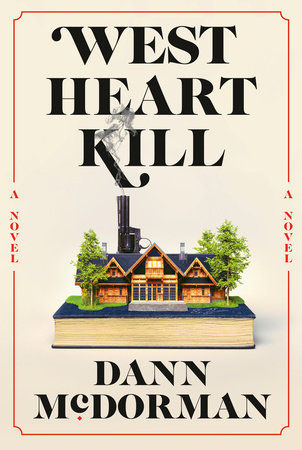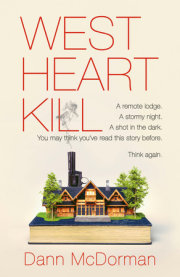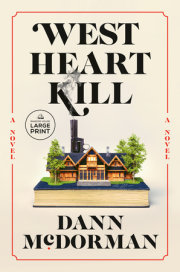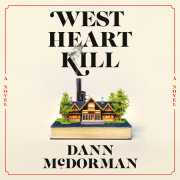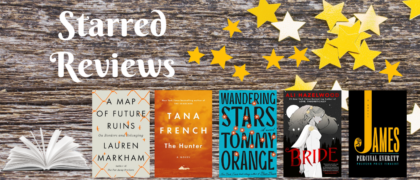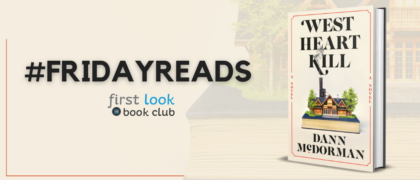Thursday This murder mystery, like all murder mysteries, begins with the evocation of what the reader understands to be its atmosphere, the accumulation of small, curated details to create a shared myth of mood, time, and place—though not all at once, of course, that is important. The writer of murder, like all writers, must be a miser, conceding revelations bit by bit; for every novel is a puzzle, and every reader a sleuth.
Not all mysteries begin with the protagonist, but this one does. He is riding in the passenger seat of a car; these opening sentences don’t reveal the year, model, and make, that would be too simple, but you do see the protagonist pushing an 8-track into the dashboard, Wings at the Speed of Sound, music bounces out—“Let ’Em In.” The protagonist is smoking something, a joint, passing it back to a new character, the driver, whose presence was implied at the start of this paragraph but never explicitly stated . . . The two men—yes, both men—are dressed similarly, in clothes of an era that is not your own but that you recognize from film and television: the clues accumulate . . .
And now a crucial moment, the first bit of dialogue:
“What do they hunt at this hunting club?”
“Deer, mostly. Pheasant. A bear, once in a while.”
“People?”
“Only each other.”
They laugh, but you are thrilled; you think, perhaps, of the plot of “The Most Dangerous Game,” in which a rich eccentric lures unsuspecting men to his island, to hunt for sport . . . Is this to be that kind of story? But listen, they are speaking again:
“My family is one of the poorest here. We’re really only allowed to stay because we were originals, founding members.”
“How many families?”
“Maybe three dozen? More? They all have their own cabins, all over the property. Every few years, a member leaves, a new one is added. The dues are steep.”
“And what does all that money get you?”
“Hunting grounds. A lake stocked with fish and canoes. The clubhouse. Meals prepared for big parties.”
“Like this one.”
“Yes, fireworks on the Fourth of July. Also, Memorial Day . . . Labor Day . . . New Year’s. Any excuse, really, to drink too much and ogle other people’s wives.”
“There are less expensive ways to have an affair.”
“These people have money to burn. Or did. But what they’re really paying for is separation. Privacy. Miles and miles of empty trails. Graves in which to bury their secrets.”
“Will you get any reaction for inviting a bum like me?”
“No, they’ll view you as a new toy, something to toss from one paw to another and then be condescending about later, over drinks.”
“Sounds wonderful.”
“It’s worth it, just to get out of the city. It’s falling apart. And too goddamn hot right now. You said you didn’t have any work, anyway.”
“I did get one case.”
“What is it?”
“Nothing interesting. Not in the city.”
“Fine, don’t tell me. Anyway, I think the women will like you . . .”
The joint has burned down to the roach; a state-police cruiser passes, and both men’s eyes dart warily to the rearview mirror—shit, did he see them, is he going to turn around, lights and siren blaring . . . And it’s only now that the dialogue’s clues begin to click into place; you’re convinced, though nothing thus far indicates one way or another, that the protagonist is the stranger who’s been invited up for the weekend, and that the driver is the one dropping all those artfully foreshadowed details about the hunting club. You now know the date, perhaps the decade, too; the socioeconomic status of this hunting club; and perhaps also something about the moral character of its members. These insinuations of sex don’t disturb you, you’re no prude, though it’s not exactly what you’re looking for from a mystery; in fact, you’re hoping this is not one of those books where the author embroiders or obscures the story with sex or violence or gimmickry. The real writers, the ones you trust and return to again and again, have no need of such cheap deceits.
The police cruiser continues out of sight, and both men relax. They switch on the radio, which is broadcasting an ominous weather report, and their talk turns to matters that need not concern us here: old friends, politics, film, music . . . You sense they knew each other quite well, long ago, but haven’t talked much in recent years, and you wonder why, now, they have become reacquainted. You sense that this, too, might be part of the mystery.
But you are also pondering that earlier word case: is our protagonist, then, a private detective? You feel the book settle into the comfortable formula of its genre. Of course there is a detective, there must be a detective. Very well, then. You can perceive the contours of the plot ahead, anticipate its false clues and blind alleys, the ways in which this writer will try to conceal the truth in plain sight, like a purloined letter on a mantelpiece; you just hope that the rules of the form are followed, because a mystery that cheats is the worst kind of fraud.
But we’ll return to those rules later; for now the car’s wheels are crunching on gravel as it turns off the main highway and onto the unpaved road that must lead to the hunting club and, you anticipate, to death . . . Orange no trespassing signs are nailed to trees along the road, each emblazoned with the name of the club—West Heart—and its insignia: a bear’s head with two rifles crossed behind it, resembling, you can’t help but think, a skull and crossbones.
Copyright © 2023 by Dann McDorman. All rights reserved. No part of this excerpt may be reproduced or reprinted without permission in writing from the publisher.

